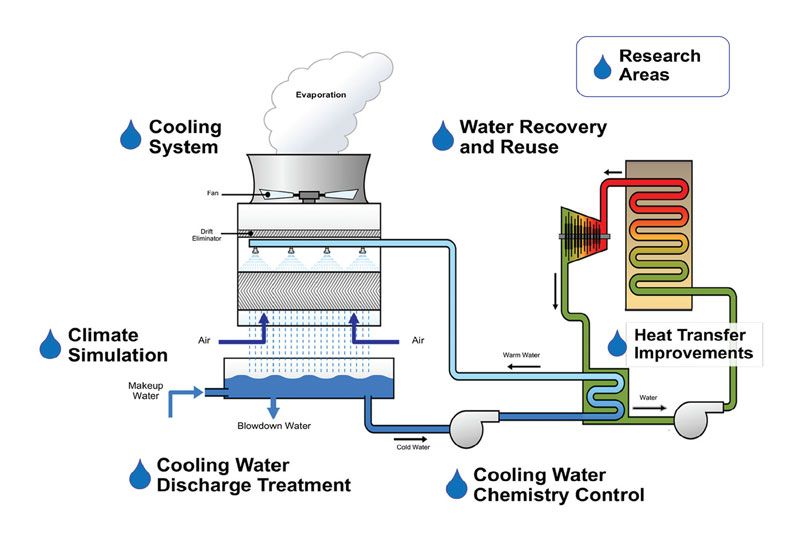EPRI to Improve Industrial Cooling Systems and Heat Transfer Process
Published on by Water Network Research, Official research team of The Water Network in Technology
More research is needed for cooling water systems to improve equipment efficiencies.
Water plays a vital role in fossil and nuclear electric power generation plants, which require large quantities of water, primarily for cooling systems.
The Electric Power Research Institute (EPRI) estimates thermoelectric consumption of fresh water for cooling in the U.S. is 3 to 4 percent of total withdrawals, which is equivalent to 3.9 billion gallons per day.
Power plants also discharge water that is no longer usable and must comply with federal and state standards and regulations for effluent.

Image: Proposed research areas for cooling system test center
(Graphic courtesy of EPRI)
In the future, stakeholder pressure and new regulations are likely to continue to increase water management restrictions for all electricity generating units, including nuclear, natural gas, coal and renewable plants. Across a range of governing agencies, new goals are expected to be outlined to address long-term issues and prevent shortages in water supply and disruptions in electricity generation.
For the energy sector, these goals include the elimination of freshwater consumption in water-stressed areas, minimized freshwater degradation, more efficient electricity use, and integrated management in the water supply and wastewater sectors. Regulatory changes could force limitations on the withdrawal and consumption of freshwater, which could have significant negative impacts on efficiency and operating costs and will require technology breakthroughs in cooling and heat transfer. Timing is also a concern because the future of water regulations is uncertain and could outpace technological developments.
EPRI’s Water Management Technology Program
EPRI’s Water Management Technology Program, launched in 2013, evaluates the performance, operability, reliability and cost of advanced cooling technologies designed to reduce water withdrawal and consumption while minimizing the impact on a plant’s thermal efficiency.
These cooling technologies (such as cooling water systems) are applicable worldwide and equally to Rankine steam boiler and gas-fired, combined-cycle units. To reduce water consumption, the program evaluates processes to recover moisture from the flue gas and to enable the reuse of wastewater streams within the power plant by removing species that cause scaling and/or corrosion.
The program also identifies, evaluates and demonstrates cost-effective and reliable treatment technologies to limit pollutants discharged from a power plant.
EPRI’s Water Management Technology Program is seeking to accelerate technology development and implementation by expanding the program’s current capabilities and conducting research in the gap in the middle – between early breakthroughs and the later, larger-scale demonstrations near commercialization.
EPRI’s expanded research will incorporate a new Cooling System and Heat Transfer R&D Test Center. This center is intended to be a world-class facility to address mid- to long-term needs in power plant and industrial cooling applications. It will serve as an industry resource specifically dedicated to cooling and heat transfer improvements, such as cooling water systems (pictured above).
The test center will conduct research in the following areas:
- Advanced and alternative cooling systems (in addition to cooling water systems)
- Heat transfer improvements
- Cooling water chemistry control and discharge treatment
- Water and moisture recovery
- Supporting activities related to materials, sensors and controls
The new cooling research center will provide infrastructure for testing and evaluating technologies in real-time conditions. Access to common equipment and resources such as heat exchanger tubes, cooling towers/systems, a climate control and simulation system, and cooling water sources will allow research staff to conduct a variety of research and development (R&D) projects.
Read full article: Water Technology
Media
Taxonomy
- Water Reuse & Recycling
- Cooling Systems
- Water Resource Management
- Energy